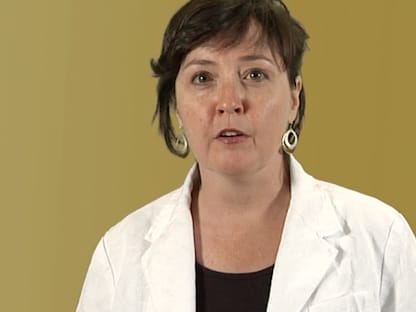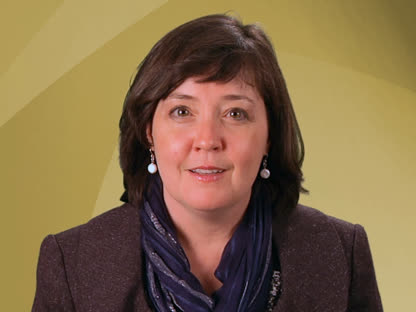HIV (Human Immunodeficiency Virus) Infection
Condition Basics
What is HIV? What is AIDS?
Human immunodeficiency virus (HIV) is a virus that attacks the immune system, the body's natural defense system. Without a strong immune system, the body has trouble fighting off disease. Both the virus and the infection it causes are called HIV.
White blood cells are an important part of the immune system. HIV infects and destroys certain white blood cells called CD4+ cells. If too many CD4+ cells are destroyed, the body can no longer defend itself against infection.
HIV can be treated. Most of the time, treatment can prevent acquired immunodeficiency syndrome (AIDS) and help people live long, healthy lives.
If HIV is not treated, it will usually get worse over time and cause AIDS. AIDS is the most severe stage of HIV infection. In people who don't get treatment, it often takes 10 to 12 years for AIDS to develop. People who have AIDS have a low number of CD4+ cells. They get infections or cancers that rarely occur in healthy people. These can be deadly.
There are two types of HIV:
- HIV-1, which causes almost all the cases of AIDS worldwide.
- HIV-2, which causes an AIDS-like illness. HIV-2 infection is rare in North America.
What causes HIV?
HIV infection is caused by the human immunodeficiency virus. People can get HIV when they come in contact with infected blood, semen, or vaginal fluids. This is usually through sexual contact or sharing needles. If you have HIV while you're pregnant, the virus can be passed to your baby during birth.
What are the symptoms?
HIV may not cause symptoms early on. If it does, symptoms include fatigue, muscle aches, skin rash, and headache. These usually go away within 2 to 3 weeks. Symptoms may not come back for years. If HIV isn't treated, symptoms will appear, be more severe, and remain. These include extreme fatigue and weight loss.
How is it diagnosed?
Doctors use tests to find HIV antibodies or antigens in blood, urine, or saliva. If the test is positive, another test, such as a polymerase chain reaction (PCR) test, may be done to be sure. Sometimes a PCR test is done at the same time as the first test.
How is HIV treated?
HIV is treated with a mix of medicines called antiretroviral therapy (ART). Often the medicines are combined into a single pill. ART can reduce the amount of virus in your body. Taking the medicine can prevent AIDS and help you stay healthy.
How can you prevent it?
To help prevent HIV, use a condom every time you have sex. Take medicine to prevent HIV (PrEP) if you're at high risk. If you have a sex or injection partner who has HIV, encourage them to get treatment. If you inject drugs, don't share needles or other injection supplies.
Health Tools
Health Tools help you make wise health decisions or take action to improve your health.
How It Spreads
How is HIV spread?
People can get HIV when they come in contact with infected blood, semen, or vaginal fluid. This usually happens through:
- Sexual contact. The virus may get in through the lining of the rectum, vagina, urethra, or mouth. Most cases of HIV are spread this way.
- Infected blood. HIV can be spread when a person:
- Shares needles, syringes, or other tools used to inject drugs or steroids.
- Is poked with a needle or other sharp item that has infected blood on it.
If you have HIV, you can spread it to your baby during pregnancy, during birth, or when breastfeeding.
A lot of people who have HIV don't realize that they're infected, so they can spread it without knowing it.
What Increases Your Risk
You're at greater risk of getting infected with HIV if you:
- Are a man who has sex with other men.
- Have unprotected sex with more than one partner.
- Inject drugs or steroids, especially if you share needles, syringes, cookers, or other supplies used to inject drugs.
- Have unprotected sex with a high-risk partner. This means any partner who has multiple sex partners or who injects drugs, or who is a man who has sex with other men.
- Have or recently had a sexually transmitted infection (STI), such as syphilis or genital herpes.
Being born to someone who has HIV increases the risk of infection. But with treatment, the risk is very low.
Learn more
Prevention
HIV is usually spread by people who don't know they have it. That's why it's important to get tested and to have regular testing if you're at high risk of getting infected. It's also important to take other steps to protect yourself and others.
- Use a condom every time you have sex.
- Don't have sex when you are using alcohol or drugs. This makes it less likely that you'll use a condom.
- Limit the number of sex partners you have.
- If you inject drugs or steroids, don't share needles, syringes, or other injection supplies.
- If you have a sex or injection partner who has HIV, encourage them to get treated. HIV medicines can greatly reduce the chance that they will pass the infection to others.
- Take medicine to prevent HIV if you're at high risk. This is called pre-exposure prophylaxis (PrEP). PrEP is very good at preventing HIV when it's taken as prescribed.
- If you think you've been exposed to HIV, talk to a doctor right away. There is medicine called post-exposure prophylaxis (PEP) that can prevent HIV, but it needs to be started within 72 hours of exposure.
Learn more
Symptoms
HIV may not cause symptoms early on. People who do have symptoms may mistake them for the flu or mono. The symptoms may include:
- Fatigue.
- Muscle aches.
- Skin rash.
- Headache.
- Sore throat.
- Enlarged lymph nodes in the neck, armpits, and groin.
- Joint pain.
- Night sweats.
- Diarrhea.
These first symptoms can range from mild to severe. They usually go away on their own after 2 to 3 weeks. But many people don't have symptoms, or they have such mild symptoms that they don't notice them at this stage.
Later symptoms
After the early symptoms go away, a person who has HIV may not have symptoms again for years. But if HIV isn't treated, symptoms will come back, be more severe, and remain. These symptoms usually include:
- Extreme fatigue.
- Night sweats.
- Loss of appetite or unexplained weight loss.
- Swollen lymph nodes in the neck, armpits, and groin.
- Diarrhea or other bowel changes.
- Dry cough or shortness of breath.
- Nail changes.
- Pain when swallowing.
- Repeated outbreaks of cold sores or genital herpes sores.
- Mouth sores or a yeast infection of the mouth (thrush).
What Happens
After the early symptoms of HIV go away, you may have no symptoms for years. But then symptoms return. As HIV destroys certain white blood cells, your body can't defend itself against infections. AIDS is the last stage of HIV infection. Treatment can prevent AIDS and help you live about as long as someone without HIV.
When to Call a Doctor
Known HIV infection
If you are infected with HIV or caring for someone who is, call 911 or other emergency services immediately if you or the person you care for has:
- Seizures.
- Loss of consciousness.
- New weakness in an arm, a leg, or one side of the body.
- New inability to move a body part (paralysis).
- New inability to stand or walk.
Call your doctor if you or the person you care for has:
- A high fever or a fever that lasts for 24 hours.
- Shortness of breath.
- Cough that produces mucus (sputum).
- New changes in balance or sensation (numbness, tingling, or pain).
- Ongoing diarrhea.
- Unusual bleeding, such as from the nose or gums, blood in the urine or stool, or easy bruising.
- Ongoing headache or changes in vision.
- Rapid, unexplained weight loss.
- Night sweats.
- Fatigue.
- Swelling of lymph nodes in the neck, armpits, or groin.
- Unusual sores, rashes, or bumps on the skin or around the genitals, anus, or mouth, or increased outbreaks of cold sores.
- Personality changes or a decline in mental ability, such as confusion, disorientation, or an inability to do mental tasks that were possible in the past.
Suspected or known exposure to HIV but no symptoms
If you have not been tested for HIV, call your doctor right away to see if you should start medicine to prevent HIV if:
- You suspect that you have been exposed to HIV.
- You have engaged in high-risk behavior and are concerned that you were exposed to HIV.
- Your sex partner engages in high-risk behavior.
- Your sex partner may have been exposed to HIV.
- Your sex partner has HIV.
Public health clinics and other organizations may provide free or low-cost, confidential testing and counseling about HIV and high-risk behavior.
Exams and Tests
HIV is usually diagnosed with a blood test. Some tests use saliva or urine.
An HIV test checks for HIV antibodies or antigens. If HIV antibodies or antigens are found, the test is considered positive. If the test is positive, another test, such as a polymerase chain reaction (PCR) test, may be done to be sure. Sometimes a PCR test is done at the same time as the first test.
Even if HIV antibodies or antigens aren't found, you may need to be tested again, especially if you think you have been recently exposed. This is done to make sure that HIV antibodies or antigens don't appear at a later time.
Monitoring HIV after diagnosis
Soon after you are diagnosed with HIV, you will have other blood tests. These tests help your doctor see how your body is responding to the virus. They also help show how well your treatment is working.
These tests may be done every couple of weeks to every few months. The first set of tests serves as a baseline. Your doctor can compare the results of future tests with the first set. Your doctor will look at the results of several tests over time to see if the infection is getting better with treatment and that the medicines aren't causing any problems.
These tests include the viral load test, a CD4+count, and the HIV drug resistance test. You may also have tests for other infections and to check your health status.
Diagnosing AIDS, the most severe form of HIV
AIDS is diagnosed when one or both are true in a person with HIV:
- The person has a CD4+ cell count of less than 200 cells per microliter (mcL).
- The person gets infections or cancers that are usually seen only in people who have immune system problems. Examples include Pneumocystis pneumonia and Kaposi sarcoma.
Screening for HIV
The U.S. Centers for Disease Control and Prevention (CDC) recommends that all people should get tested for HIV as part of their regular medical care.
The United States Preventive Services Task Force (USPSTF) recommends HIV testing for:footnote 1
- People 15 to 65 years old as part of regular medical care.
- Anyone who is pregnant.
- People younger than 15 and older than 65 if they have a high risk for HIV, such as people who do things that put them at a higher risk for HIV. One thing that puts people at a higher risk is being a man who has sex with other men. Another thing is sharing needles, syringes, and injection supplies with other people. The more high-risk things you do, the higher your risk.
You and your doctor can decide if testing is right for you.
Learn more
Watch
Treatment Overview
HIV is treated with a mix of medicines called antiretroviral therapy (ART). Often the medicines are combined into a single pill. ART slows the rate at which the virus grows and can reduce the amount of virus in your body. Taking the medicine can prevent AIDS and help you stay healthy.
Experts suggest that people start treatment for HIV as soon as they know that they're infected.
It's important to take your medicines exactly as directed. When treatment doesn't work, it's often because the virus has become resistant to the medicine. This can happen if you miss doses.
Treating AIDS, the most severe stage of HIV
AIDS is treated with medicines. These include:
- Antiretroviral therapy (ART). These medicines can reduce the amount of virus in your body and help you stay healthy.
- Medicines to prevent opportunistic infections, such as Pneumocystis pneumonia.
After you start treatment, it's important to take your medicines exactly as directed. When treatment doesn't work, it is often because HIV has become resistant to the medicine. This can happen if you miss doses.
Being diagnosed with AIDS may cause stress or other emotions. If you need more support, ask your doctor to connect you with a counselor. Talking with someone about these feelings may help.
Learn more
Self-Care
When you have HIV, there are things you can do to feel better and lead an active life. Here's how.
- Take your HIV medicine exactly as directed.
Talk to your doctor if you have problems such as trouble paying for your medicine or missing doses. Your doctor wants to help.
- Take care to avoid food poisoning.
Having HIV means you're more likely to get food-borne diseases. So learn how to handle, prepare, and store food safely to reduce your risk.
- If you smoke, try to quit.
Having HIV increases your risk of heart attacks and lung cancer. Smoking increases these risks even more. If you need help quitting, talk to your doctor about stop-smoking programs and medicines. These can increase your chances of quitting for good.
- Eat healthy foods.
Good nutrition can help your immune system and improve your overall health. Talk to your doctor or see a dietitian if you need help.
- Get regular exercise.
Exercise helps relieve stress and helps you feel less tired. It also keeps your heart, lungs, and muscles strong. And it may help your immune system work better.
- Learn more about HIV.
This will let you take a more active role in your care.
- If you inject drugs, use new, clean syringes and needles every time.
Don't share injection supplies with others.
- Get the support you need.
- Join a support group. This can be a good place to share information, problem-solving tips, and emotions.
- If you need more support, ask your doctor to connect you with a counselor. Counseling can help you cope with stress and stigma, and it can help if you have substance use disorder or a mental health condition.
Learn more
Watch
Medicines
Medicines used to treat HIV are called antiretrovirals. Usually two or three are combined into one pill. This is called antiretroviral therapy (ART). There are many possible combinations.
Taking ART can prevent AIDS and help you live a healthy life. And it can help prevent the spread of HIV to others. But ART doesn't cure HIV, so you will need to keep taking it.
When choosing medicine for you, your doctor will think about:
- How well the medicines reduce HIV in your blood.
- How safe the medicines are.
- Other medicines you take and your health history.
- The cost of medicines.
- Helping your treatment fit into your schedule.
Over time, ART medicines might stop working to control the virus. This is called resistance. Taking your medicine as directed can help prevent it. If resistance happens, your doctor will look for another mix of medicines that will work.
Drug resistance
Drug resistance happens when disease-causing organisms change (mutate) over time. Those changes can make the organisms survive treatment that would usually kill or control them.
Because HIV mutates often, it can easily become drug-resistant. This can make HIV harder to treat. Sometimes people become infected with HIV that is already drug-resistant.
Missing doses of your HIV medicines increases your risk of drug resistance. That's why it's important to take your medicines as directed.
Learn more
Counseling
Living with a chronic illness like HIV can affect your mental health. Having HIV can be stressful and isolating. Depression is common in people who have HIV. Some medicines for HIV increase the risk of depression. And having a mental health condition or substance use disorder may make it hard to take your medicine every day as directed, which is important for your long-term health.
Counseling can help you feel better. Working with a counselor, you can learn ways to cope with stress and stigma. It may help you improve relationships with loved ones. If you have a mental health condition or substance use disorder, counseling may help you stick with your treatment. Your doctor can connect you with a counselor.
Learn more
Watch
Credits
Current as of: September 10, 2024
Author: Ignite Healthwise, LLC Staff
Clinical Review Board
All Ignite Healthwise, LLC education is reviewed by a team that includes physicians, nurses, advanced practitioners, registered dieticians, and other healthcare professionals.
Current as of: September 10, 2024
Author: Ignite Healthwise, LLC Staff
Clinical Review Board
All Ignite Healthwise, LLC education is reviewed by a team that includes physicians, nurses, advanced practitioners, registered dieticians, and other healthcare professionals.





